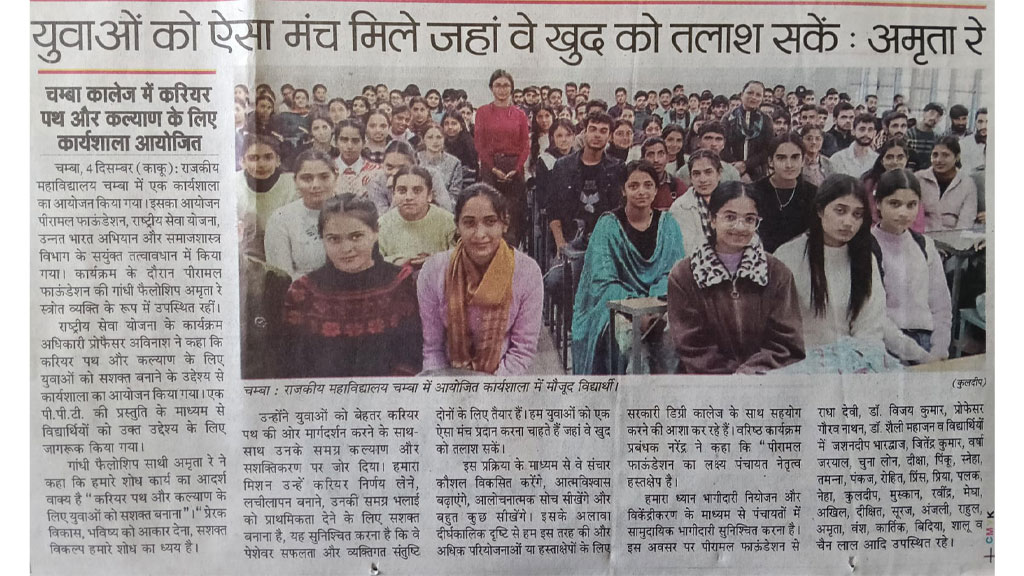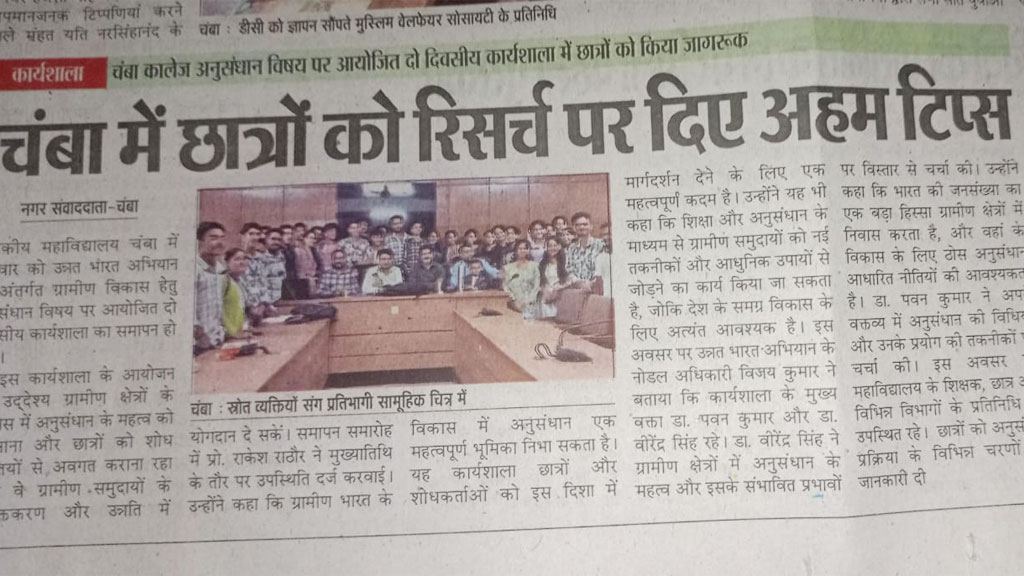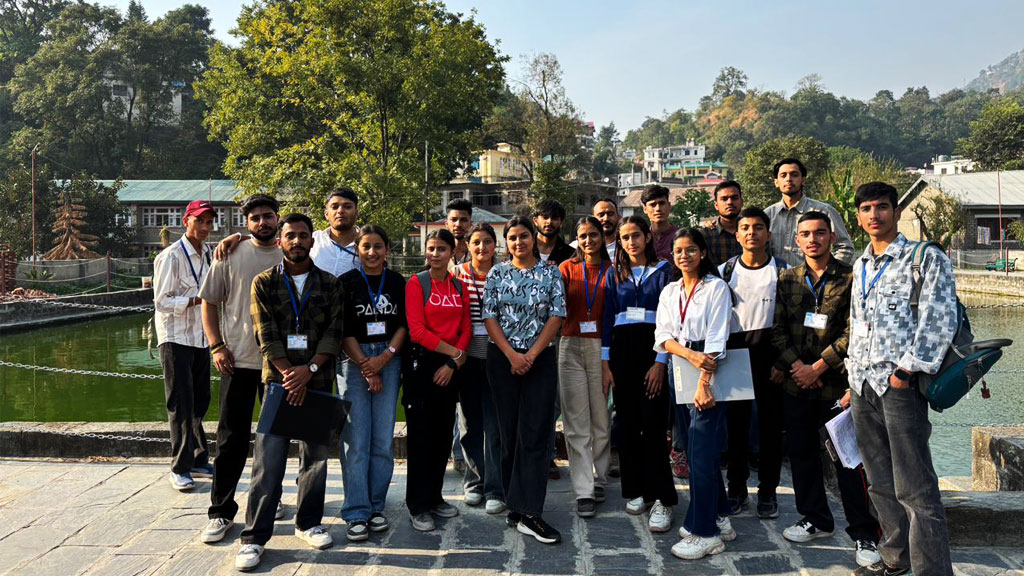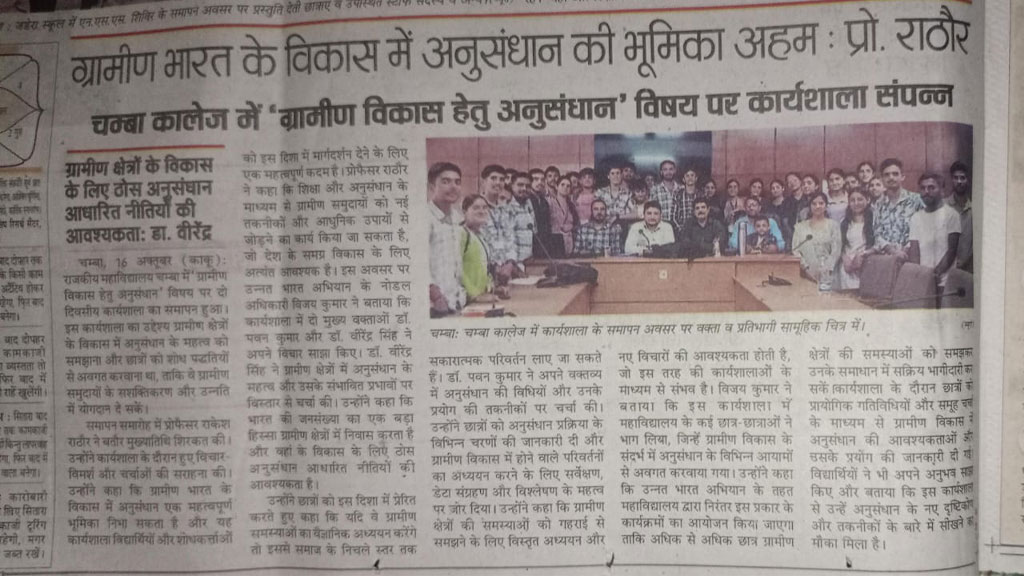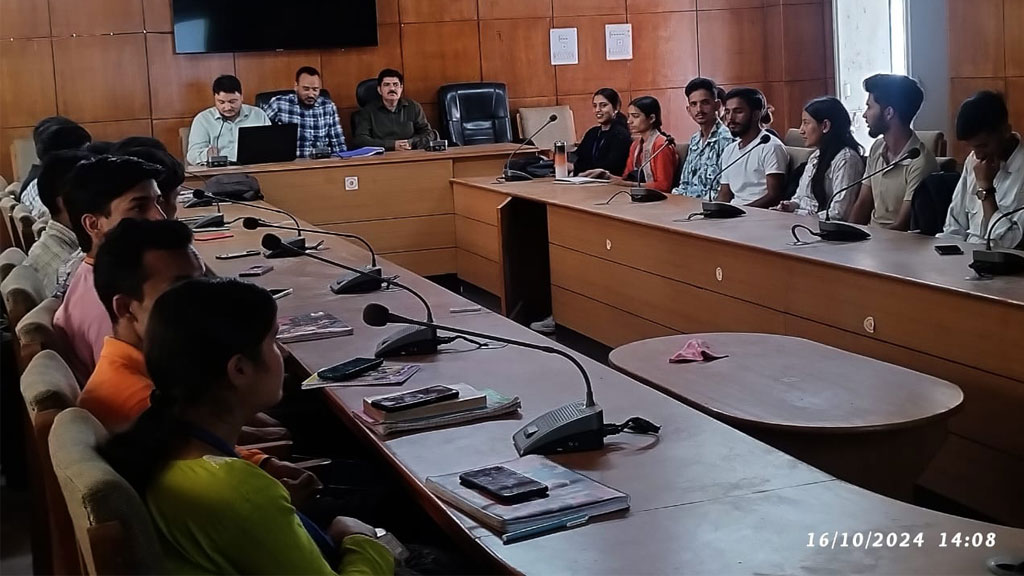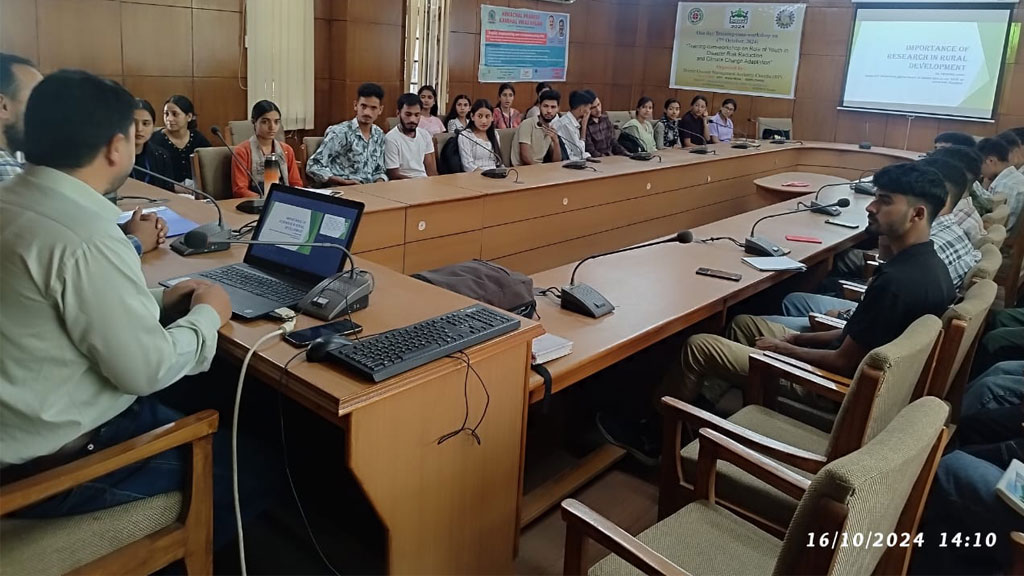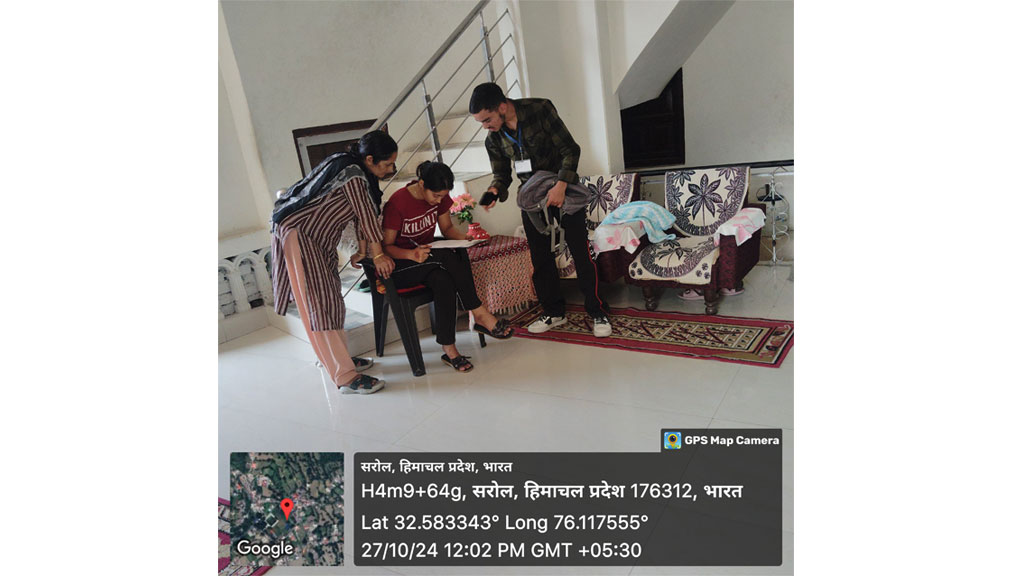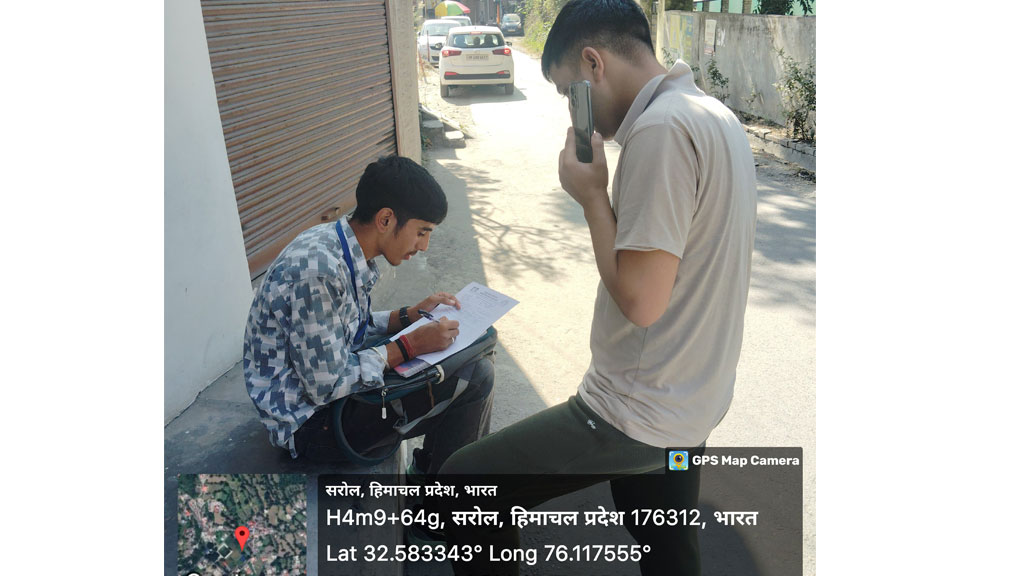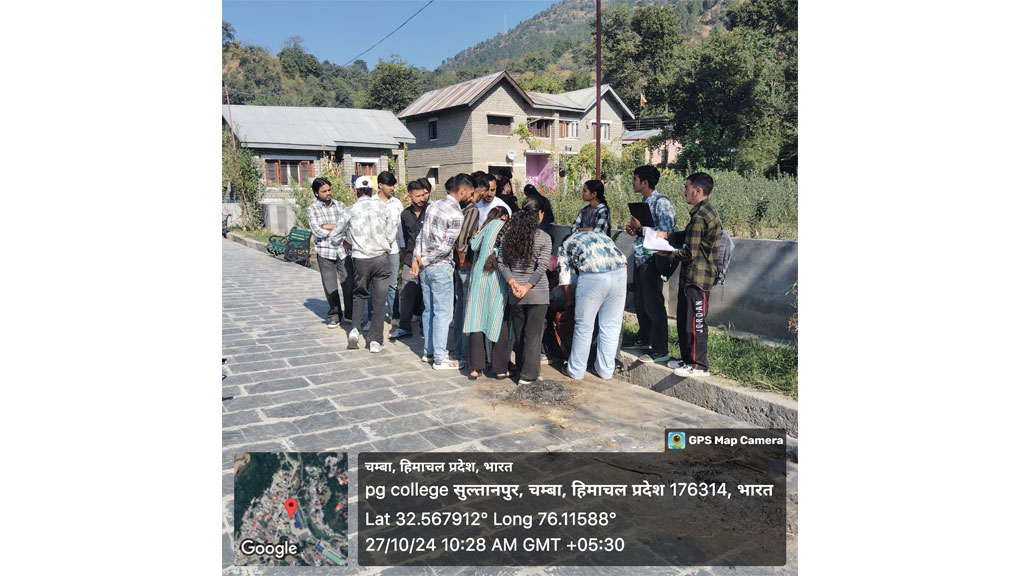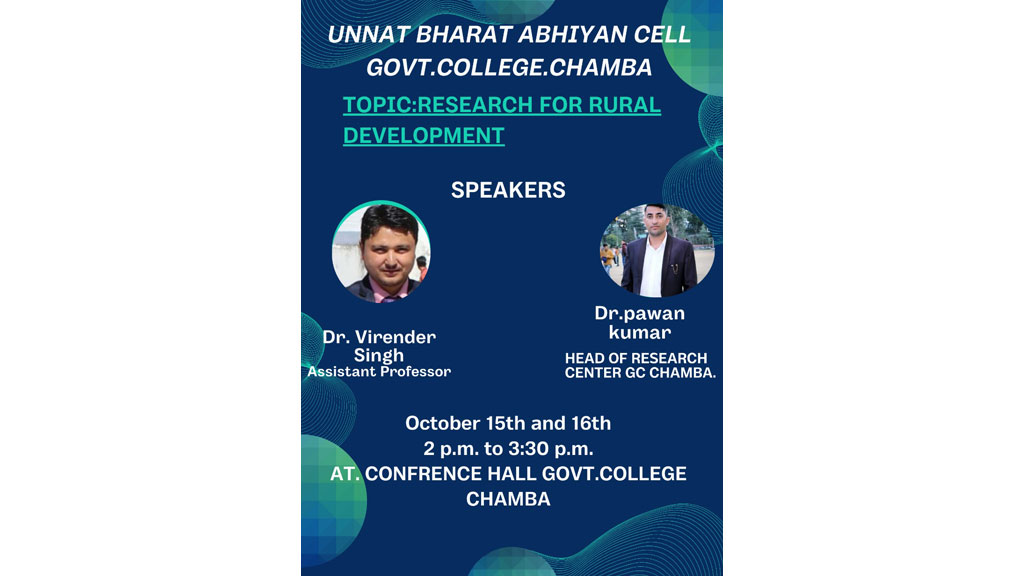Student Zone
Unnat Bharat Abhiyan Cell
Government College Chamba, H.P.
Ministry of Human Resource Development has launched the Unnat Bharat Abhiyan (UBA) on 11th November, 2014, with a view to bring a transformational change in rural development processes by leveraging knowledge institutions to help build the architecture of an Inclusive India, The Unnat Bharat Abhiyan is conceptualized as a movement to connect institutes of higher education with local communities to address the development challenges of rural India through appropriate technological inventions.
VISION
Unnat Bharat Abhiyan is inspired by the vision of transformational change in rural development processes by leveraging knowledge institutions to help build the architecture of an Inclusive India.
MISSION
The Mission of Unnat Bharat Abhiyan is to enable higher educational institutions to work with the people of rural India in Identifying development challenges and evolving appropriate solutions for accelerating sustainable growth. It also aims to create a virtuous cycle between society and an inclusive academic system by providing knowledge and practices for emerging professions and to upgrade the capabilities of both the public and the private sectors in responding to the development needs of rural India.
GOALS
- To build an understanding of the development agenda within institutes of Higher Education and an institutional capacity and training relevant to national needs, especially those of rural India.
- To re-emphasize the need for field work, stake-holder interactions and design for societal objectives as the basis of higher education.
- To stress on rigorous reporting and useful outputs as central to developing new professions.
- To provide rural India and regional agencies with access to the professional resources of the institutes of higher education, especially those that have acquired academic excellence in the field of science, engineering and technology, and management.
- To improve development outcomes as a consequence of this research. To develop new professions and new processes to sustain and absorb the outcomes of research.
- To foster a new dialogue within the larger community on science, society and the environment and to develop a sense of dignity and collective destiny.
MAIN OBJECTIVES OF SCHEME
- Encourage Indian higher education Institutions to engage with problems of rural India and to provide solutions for them.
- Develop an academic framework for working on societal problems, their solution, delivery, reporting and assessment.
- Develop over time, research areas which have developmental significance, such as drinking water, education, health, agricultural practices, electrification, agricultural and rural industries cooking energy, watershed analysis.
- Promote networking and coordination among various science and technology based voluntary organizations and developmental agencies.
- Foster collaborations between governance, knowledge institutions and local communities.
- Provide rural India with professional resource support from institutes of higher education,specially those that have acquired academic excellence in the field of science engineering and technology, and management.
- To identify the basic developmental and productive needs of a village and find ways and means to meet these needs.
- Strengthen the technical design of interventions in key sectoral areas of natural resource management such as water and soil, economic activities such as agriculture and related production, or related to crafts and artisans,infrastructure such as housing, roads, energy
VILLAGE ADOPTED UNDER UNNAT BHARAT ABHIYAN
The Government College Chamba has adopted the following Gram Panchayats under the Unnat Bharat Abhiyan.
- Sultanpur
- Mehla
- Haripur
- Udaipur
- Sarol
Unnat Bharat Abhiyan at Government College Chamba
- Government College Chamba is actively participating in the Unnat Bharat Abhiyan (UBA) with the involvement of students and faculty members. A UBA Cell has been constituted, comprising 55 students and 5 faculty members.
- In consultation with the District Administration, Chamba, a cluster of five villages has been identified for developmental initiatives.
- Initial discussions with the residents of these villages are underway to understand their challenges and explore feasible solutions.
The UBA Cell of the following officials is constituted to implement the activities under UBA.
Faculty and Student Council
PI Coordinator
| Name | Designation |
|---|---|
| Dr. Vijay Kumar | Assistant Professor, Commerce |
Faculty Members
| Sr.No. | Name | Department | Additional Role |
|---|---|---|---|
| 1 | Dr. Avinash Pal | Zoology | NSS Programme Officer |
| 2 | Dr. Virender Singh | Commerce | - |
| 3 | Dr. Kuldeep Raj | English | - |
| 4 | Dr. Pawan | Education | - |
| 5 | Prof. Santosh Kumari | Economics | NSS Programme Officer |
Student Council
55 Students
KEY AREAS WHERE THE UBA CELL HAS IDENTIFIED TO WORK ON AT THESE VILLAGES ARE:
Community Development and Environmental Conservation
- Awareness campaigns about natural water bodies, including ponds and step wells, focusing on cleanliness and preservation.
- Cleanliness drives and waste management initiatives, promoting the adoption of a twin-bin system for effective waste segregation and recycling.
- Tree plantation drives on Panchayat land and awareness sessions on eco-friendly practices, sanitation, social forestry, and watershed management.
Sustainable Agriculture and Livelihood Enhancement
- Promoting organic farming to protect soil fertility and introducing improved crop varieties suitable for marginal areas.
- Encouraging supplementary income sources like honeybee rearing and livestock farming (goats and sheep).
- Training programs on rural entrepreneurship, including small-scale industries for bag fabrication, pickle and jam preparation, sanitary pad production, and traditional crafts.
Social Awareness and Welfare Campaigns
- Conducting awareness drives on fundamental rights and duties through the Legal Aid Clinic.
- Promoting gender equality through Beti Bachao Beti Padhao campaigns.
- Organizing blood donation and health camps in adopted villages.
Skill Development and Technology Awareness
- Lectures on the use of solar energy and water recycling methods.
- Encouraging rural industrialization and entrepreneurship development.
Infrastructure Improvement and Resource Conservation
- Collaborating with district authorities for footpath reconstruction and water conservation projects, including the construction of water tanks for natural spring storage.
This streamlined approach ensures a focused, impactful engagement with the community for sustainable rural development.
RECENT ACTIVITIES
- व्याख्यान "ग्रामीण विकास के लिए समग्र दृष्टिकोण" 5 अक्टूबर 2024
- ‘ग्रामीण विकास हेतु अनुसंधान' विषय पर दो दिवसीय कार्यशाला, 16, 17 अक्टूबर 2024
- Baseline Data Collection form Villages Adopted
- One Day seminar on topic “Constitutional provisions regarding Rural Administration In India” 14th February, 2025

